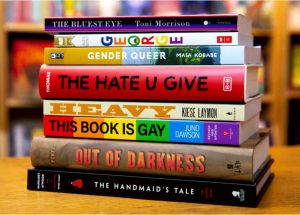To mark Banned Books Week (October 1 - 7), we're pleased to offer this thoughtful blog post by Kate DeMeester-Lane, Library Services Manager, about our—and everyone's—First Amendment right to read freely, known amongst libraries as The Freedom to Read.
The Freedom to Read
One of our foundational rights as Americans is the Right to Free Speech, also known as the First Amendment to the Constitution of the United States. The First Amendment has guaranteed Americans' rights, and because of those rights, we also may read freely and access the materials that we choose for ourselves. This is known amongst libraries as The Freedom to Read. Public libraries protect The Freedom to Read for literally every single person in our community. Sometimes people believe libraries defend the content within our collections, however, public libraries do not defend the content of any item on our shelves or available digitally for download. What we staunchly protect is the right of each community member to select and access materials for themselves as they wish.
At Pima County Public Library (PCPL), the public influences our collections in several ways. We strive to develop and maintain collections where everyone in our community is able to find materials that interest them. First, we pay close attention to the trends in the types of materials checked out. We notice what formats customers are using. Unsurprisingly, in a post-pandemic world, we’ve seen our use of digital materials skyrocket. Pre-COVID, digital materials were only about 20-30% of our circulation statistics. Today, our circulation is now consistently comprised of about half digital and half physical checkouts, and we are on track for a total of almost 4.5 million total circulations for this fiscal year. For our fiction readers, we focus on popular genres like mystery or romance. The needs of growing minds are addressed with collections for children, tweens and teens. And we consider deeply the sorts of information customers need from our non-fiction collections, whether the question at hand is how to start a business or how to bake a pie.
Second, each cardholder is able to submit 15 requests per month for new items to add to our collection. We have been receiving between 2,000 and 2,500 individual suggestions per month, and tend to purchase about half of the titles suggested. This helps us know where there may be gaps in our collections and what topics are of current interest to our community.
Fortunately, our Requests for Reconsideration of Materials have been few and far between. But like many public libraries across the country, we’ve seen our complaints on the rise. PCPL had only two Requests for Reconsideration of Materials in 2022, but we’ve already had one Request during the first third of 2023, along with half a dozen more generalized complaints about LGBTQ+ materials in our children’s department. Book challenges and book banning are not new ideas, and librarians work to address book challenges and bans using a set of professional and ethical best practices honed over decades. Our philosophical foundations go back to the writings of John Stuart Mill, and have remained constant over time. We exist to do the greatest good for the greatest possible number of people in our community, and we know that allowing ideas to be freely tested by each individual for relevance to their own needs returns the best results.
Ultimately, I feel I can state the view of PCPL in particular and libraries in general best with a quote from the final paragraph of the Freedom to Read Statement written by the American Library Association (ALA):
We state these propositions neither lightly nor as easy generalizations. We here stake out a lofty claim for the value of the written word. We do so because we believe that it is possessed of enormous variety and usefulness, worthy of cherishing and keeping free. We realize that the application of these propositions may mean the dissemination of ideas and manners of expression that are repugnant to many persons. We do not state these propositions in the comfortable belief that what people read is unimportant. We believe rather that what people read is deeply important; that ideas can be dangerous; but that the suppression of ideas is fatal to a democratic society. Freedom itself is a dangerous way of life, but it is ours.
Learn more about the Freedom to Read
The links below include a wealth of information about your rights and how to speak out.
The Freedom to Read Statement | Advocacy, Legislation & Issues (ala.org)
Access to Library Resources and Services | Advocacy, Legislation & Issues (ala.org)
First Amendment and Censorship | Advocacy, Legislation & Issues (ala.org)
Library Bill of Rights | Advocacy, Legislation & Issues (ala.org)
Toolkit - Unite Against Book Bans
Find Unbiased Reviews
The Top 10 Most Challenged Books of 2022
Check them out. Have conversations. Advocate.
The Perks of Being a Wallflower
The Absolutely True Diary of A Part-time Indian


